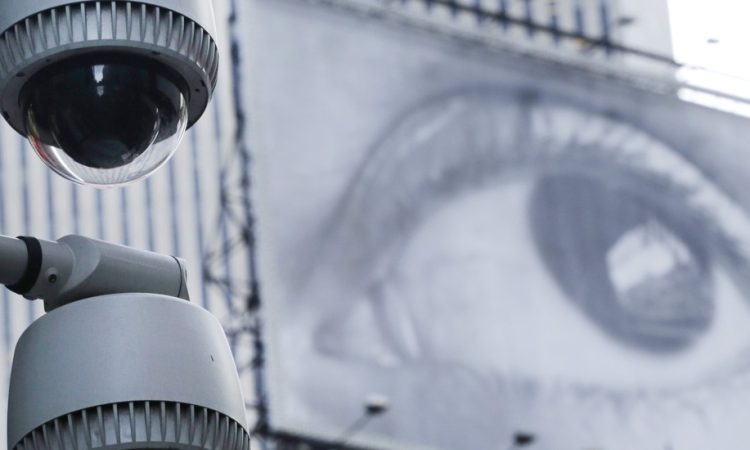
At this very moment, as you read these words, you might be under surveillance. No warrants are necessary, no laws are being broken. Welcome to the new reality of American life—a world in which privacy has become an illusion and nearly every move we make is recorded, analyzed, and often monetized.

The most visible signs of this surveillance are the millions of cameras capturing footage across cities. America now has as many surveillance cameras per capita as China, with police departments from New York to Los Angeles coupling these cameras with facial recognition technology to track individuals. Yet, the surveillance doesn’t end with cameras. Every click, search, and social media “like” is logged, packaged, and sold by data brokers to fuel a digital advertising market worth nearly one trillion dollars. Our devices, once sources of personal freedom, have become tools of “surveillance capitalism.”
This is more than just digital marketing; it’s an omnipresent network designed to track our movements, preferences, and even mental health. Byron Tau, author of Means of Control, explains that data brokers collect and sell our personal information to corporations, researchers, and government agencies alike. “It’s very, very difficult to escape the kind of logging and surveillance that modern technology brings,” he says. According to Tau, every app on your phone is a potential entry point for data extraction—an open window into your life that app developers monetize without your knowledge.
Shoshana Zuboff, who coined the term “surveillance capitalism,” describes the internet as a “prison.” What began as a tool for communication and information has evolved into an omnipresent force, capturing and selling insights about our lives without our consent. Data brokers exploit our personal information for profit, and it doesn’t end with simple ads or product suggestions. Your contact lists, location, calendar, and browsing habits are all fodder for sale.
Even law enforcement has turned to private data sources to track citizens without needing warrants or judicial oversight. “Fog Reveal,” a little-known tool, enables police to map individuals’ “patterns of life,” constructing detailed profiles without triggering legal red tape. Meanwhile, the U.S. government quietly employs a loophole within the Foreign Intelligence Surveillance Act (FISA) to continue monitoring American citizens, skirting the legal requirements designed to protect privacy.
License plate readers are yet another way that technology quietly tracks us. Police departments install cameras to capture plate numbers, vehicle types, bumper stickers, and even vehicle damage. Every recorded image is saved in a vast database, allowing authorities to search for any vehicle across multiple years and cities. Dave Maas, an investigative director at the Electronic Frontier Foundation, criticizes this as “one of the most pernicious and offensive technologies in the United States.” It’s invasive and indiscriminate, collecting data on people who are not suspected of any crime—data that might follow them indefinitely.
This constant monitoring extends into our most private spheres, including health. Duke University found that data brokers profit from lists identifying individuals with mental health conditions like depression, PTSD, and anxiety. These lists are harvested from medical apps and websites, potentially influencing the treatment options or opportunities made available to individuals.
This level of surveillance represents what Constitutional attorney John Whitehead calls a direct violation of the Fourth Amendment. “The Fourth Amendment’s dead,” he says, pointing to “predictive policing” systems that collect data on people’s habits without oversight. Whitehead argues that this level of monitoring erodes our constitutional protections, creating an environment where privacy is at best an afterthought.
This issue cuts across political lines; it should be concerning to Americans of every background and belief. Regardless of the causes or issues you care about, unchecked surveillance can harm your rights and limit freedoms.
Efforts to curb surveillance have reached Capitol Hill, yet legislative action has been limited. A recent law prevents data from being sold to some foreign governments, but it does little to protect Americans’ privacy from domestic actors. With data harvesting now entrenched as a major economic driver, reversing this trend requires a groundswell of public demand for reform.
So, what can citizens do? Experts advise taking a defensive stance. Avoid granting apps unnecessary permissions, opt for encrypted messaging services, and use search engines that don’t track your queries. You can delete your phone’s advertising ID, which allows advertisers to track your movements. Data removal services also offer ways to delete some of your information from the data marketplace, though these come at a price.
In a surveillance state where nearly every detail of our lives is up for sale, the true cost is the erosion of our privacy and autonomy. Only when Americans demand comprehensive privacy protections will there be hope of regaining control over our personal information. The question is: Will we act before privacy disappears altogether?
SOURCE: https://cbn.com/news/us/america-has-become-surveillance-prison-our-devices-and-our-government-are-spying-us




